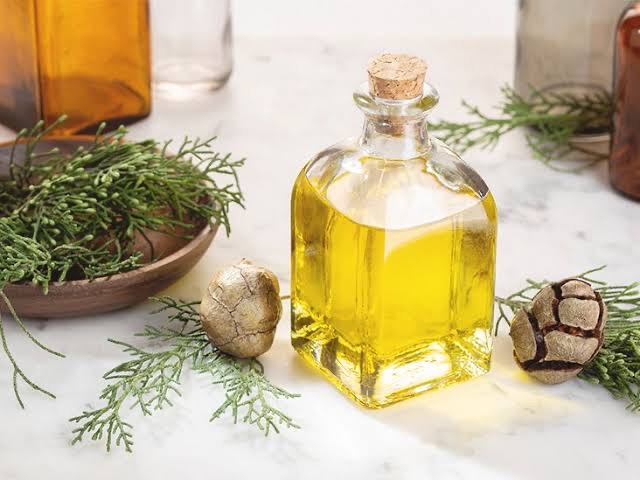Because of its healing qualities, cypress—which comes from the Mediterranean cypress tree (Cupressus sempervirens)—has been used for ages in traditional medicine and skincare. Particularly well-known for its skin-benefitting properties is cypress essential oil, which is derived from the leaves, twigs, and stems of the tree. This article examines the effects of cypress on the skin, emphasizing its advantages, applications, and possible side effects.
What is Cypress?
Cypress essential oil is obtained through steam distillation of the cypress tree’s needles, cones, and twigs. The oil is rich in monoterpenes, such as alpha-pinene and limonene, which contribute to its distinctive aroma and therapeutic properties. Cypress oil is known for its antiseptic, astringent, anti-inflammatory, and deodorizing effects, making it a versatile ingredient in skincare.
Benefits of Cypress for the Skin
Antiseptic and Antimicrobial Properties
Cypress oil is highly valued for its antiseptic and antimicrobial properties. It can help prevent and treat infections by inhibiting the growth of bacteria and fungi. This makes it an excellent choice for managing acne, minor cuts, and wounds, keeping the skin clean and promoting faster healing.
Astringent Effects
The astringent properties of cypress oil help tighten and firm the skin. It can reduce the appearance of large pores, making the skin look smoother and more refined. Additionally, its astringent action can help control excess oil production, which is beneficial for individuals with oily or combination skin.
Anti-Inflammatory Benefits
Cypress’s oil possesses anti-inflammatory properties that can soothe irritated skin and reduce redness. It is particularly effective in calming inflammatory conditions like acne, eczema, and rosacea. By reducing inflammation, cypress oil helps improve the overall appearance and comfort of the skin.
Circulation and Detoxification
Cypress oil is known to stimulate blood circulation and promote lymphatic drainage. Improved circulation ensures that nutrients and oxygen are efficiently delivered to skin cells, enhancing their vitality and promoting a healthy complexion. Enhanced lymphatic drainage helps remove toxins and excess fluids from the skin, reducing puffiness and improving skin tone.
Deodorizing and Refreshing
Cypress’s oil has a fresh, woody aroma that can help neutralize body odors and refresh the skin. Its deodorizing properties make it a popular ingredient in natural deodorants and body sprays, providing a pleasant and long-lasting scent.
Wound Healing
The combination of antiseptic, astringent, and anti-inflammatory properties makes cypress oil effective in promoting wound healing. It helps to clean and protect wounds from infection while supporting the skin’s natural healing process.
How to Use Cypress in Skincare

It’s oil
Cypress essential oil can be incorporated into your skincare routine in various ways. Here are some common applications and tips for using it effectively:
Dilution
Essential oils, including cypress, should always be diluted before application to the skin. Mix a few drops of cypress oil with a carrier oil, such as jojoba, almond, or coconut oil, before applying to the skin. A typical dilution ratio is 1-2% (6-12 drops of essential oil per ounce of carrier oil).
Facial Toner
Add a few drops of cypress oil to a facial toner or witch hazel to enhance its astringent properties. Apply with a cotton pad to help tighten pores and control oil production.
Acne Treatment
For spot treatment of acne, dilute cypress’s oil with a carrier oil and apply directly to blemishes using a cotton swab. This can help reduce inflammation and promote healing.
Massage Oil
Create a massage oil blend with cypress oil to improve circulation and promote detoxification. Combine it with other essential oils, such as juniper or rosemary, for enhanced benefits.
Bath Additive
Add a few drops of cypress oil to a warm bath to soothe the skin and relax the mind. The steam will help diffuse the oil, providing a therapeutic aromatic experience.
Natural Deodorant
Cypress’s oil can be added to homemade deodorants to provide a refreshing and deodorizing effect. Mix it with other essential oils, like lavender or tea tree, for added benefits.
Precautions and Considerations
While cypress’s oil offers numerous benefits, it is important to use it safely:
– Patch Test: Always perform a patch test before using cypress oil on the skin to ensure there is no allergic reaction or irritation.
– Dilution: Never apply undiluted essential oils directly to the skin, as they can cause irritation or sensitization.
– Pregnancy: Consult a healthcare professional before using cypress’s oil during pregnancy or breastfeeding, as essential oils can affect hormonal balance.
– Sensitive Skin: Individuals with sensitive skin should use cypress oil with caution and consider a lower dilution ratio to minimize the risk of irritation.
Cypress’s essential oil is a versatile and beneficial ingredient for skincare, offering antiseptic, astringent, anti-inflammatory, and deodorizing properties. When used correctly, it can help improve skin health by treating acne, tightening pores, reducing inflammation, and enhancing circulation. However, it is important to use cypress’s oil safely by diluting it properly and conducting a patch test before widespread application. By incorporating cypress’s oil into your skincare routine, you can enjoy its refreshing and therapeutic effects for healthier, more radiant skin.

